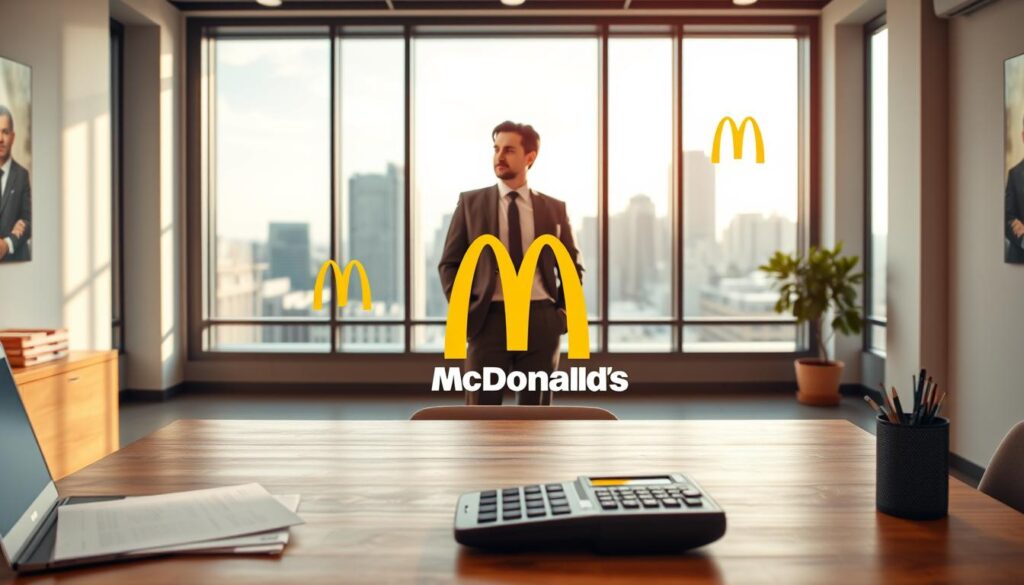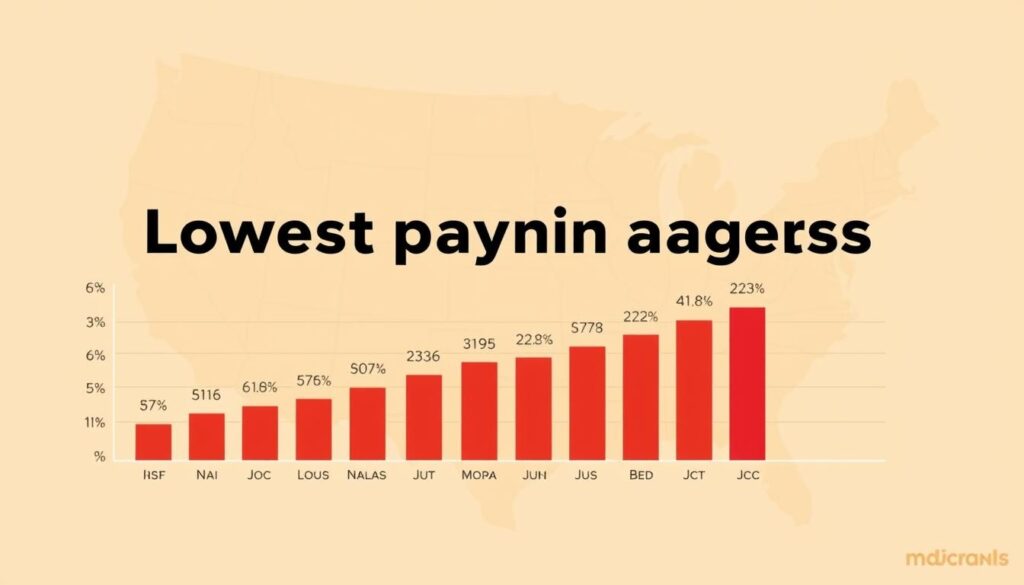Considering a career as a manager at McDonald’s? You’re likely wondering about the potential salary and benefits that come with this role.
As one of the largest fast-food chains in the US, McDonald’s offers various management positions across different restaurant locations, each with its own compensation structure.
The salary of a McDonald’s manager can vary significantly based on factors like location, experience, and the specific shift they work.
In this article, we’ll explore the national average salary figures for McDonald’s managers, geographical variations, and the benefits that come with being part of the McDonald’s management team.
Understanding McDonald’s Management Structure
Understanding the management hierarchy at McDonald’s provides insight into its operational success. McDonald’s operates with a structured management system that supports its vast network of restaurants.
Different Management Positions at McDonald’s
McDonald’s has a well-defined management structure that includes several key positions. These are:
- Shift Manager
- Department Manager
- Assistant Restaurant Manager
- Restaurant Manager
Each of thesemanagement positionsplays a crucial role in the day-to-day operations of the restaurant.
The Shift Manager oversees daily operations during their designated shift, ensuring that customer service and food quality are maintained. Department Managers are responsible for specific areas such as the front counter or kitchen. The Assistant Restaurant Manager supports the Restaurant Manager in overall restaurant operations.
Career Progression Path
McDonald’s promotes from within, allowing dedicated employees to climb the career ladder. Typically, a manager starts as a crew member and progresses through various roles, gaining experience and skills along the way.
| Position | Responsibility |
|---|---|
| Shift Manager | Oversees daily shift operations |
| Department Manager | Manages specific areas like front counter or kitchen |
| Assistant Restaurant Manager | Supports Restaurant Manager in overall operations |
| Restaurant Manager | Oversees entire restaurant operations |
As shown in the table, each management position has distinct responsibilities that contribute to the overall success of the restaurant. By understanding these roles, you can better appreciate the complexity of managing a McDonald’s location.
How Much Does a McDonald’s Manager Make?
If you’re considering a management role at McDonald’s, knowing the potential earnings is essential. McDonald’s manager salaries vary widely based on factors like location, experience, and specific job roles.
National Average Salary
The national average salary for McDonald’s managers in the United States provides a baseline understanding of what to expect. As of May 1, 2025, the median salary for a McDonald’s manager is approximately $94,220 per year. This figure represents the total compensation package, including potential bonuses and incentives beyond the base salary.
Salary Range by Percentile
To give you a clearer picture, let’s examine the salary range for McDonald’s managers by percentile:
| Percentile | Salary |
|---|---|
| 10th Percentile | $71,890 |
| 25th Percentile | $82,532 |
| 50th Percentile | $94,220 |
| 75th Percentile | $108,034 |
| 90th Percentile | $120,610 |
As shown, the salary range varies significantly, from around $71,890 at the 10th percentile to $120,610 at the 90th percentile. This variation highlights the potential for salary growth as you gain experience and move into higher-paying roles within the company.

Shift Manager Salary at McDonald’s
As a crucial part of McDonald’s management hierarchy, shift managers play a vital role in the day-to-day operations of the restaurant. They are responsible for overseeing crew members, maintaining customer service standards, and ensuring that food quality is upheld during their assigned shifts.
Responsibilities of a Shift Manager
Shift managers at McDonald’s have a range of key responsibilities, including supervising crew members, managing cash handling and inventory, and maintaining store cleanliness. They must also ensure that all safety and food handling procedures are followed by their team, which is critical for maintaining high standards of customer service and food quality.
Average Pay for Shift Managers
The average pay for shift managers at McDonald’s varies across the United States. According to national data, shift managers can earn an average salary ranging from $30,000 to over $50,000 per year, depending on factors such as location, experience, and performance.
| Location | Average Salary Range |
|---|---|
| Urban Areas | $35,000 – $45,000 |
| Rural Areas | $30,000 – $40,000 |
Shift managers often work rotating schedules, including nights, weekends, and holidays, which can impact their overall compensation and benefits. Their performance is evaluated based on key metrics such as customer satisfaction, sales growth, and team management, which can also affect their potential for raises and advancement.
Department Manager Compensation
As you explore the managerial hierarchy at McDonald’s, you’ll find that department managers play a crucial role in the day-to-day operations of the restaurant.
Role of Department Managers
Department managers oversee specific operational areas such as the kitchen, customer service, or maintenance. They are responsible for training staff in their respective areas and ensuring that departmental goals are met. By working closely with the restaurant manager, they help implement operational strategies and improve overall efficiency.
Typical Salary Range
The salary for department managers at McDonald’s can vary based on factors like location and experience. On average, they earn more than shift managers but less than assistant restaurant managers. Here is a breakdown of the typical salary range:
| Percentile | Salary Range |
|---|---|
| 25th Percentile | $35,000 – $40,000 |
| 50th Percentile | $42,000 – $48,000 |
| 75th Percentile | $50,000 – $60,000 |

Their performance is often tied to the success of their specific area and the overall restaurant performance, making them a crucial link between shift managers and upper management.
Assistant Restaurant Manager Earnings
Assistant restaurant managers are pivotal in ensuring the smooth operation of McDonald’s restaurants, supporting the manager in various capacities. As the second-in-command, you play a vital role in the daily management of the restaurant.
Key Duties and Responsibilities
Your responsibilities as an assistant restaurant manager are comprehensive, including scheduling staff, managing inventory levels, and overseeing staff development. You are also involved in maintaining customer satisfaction and ensuring that the restaurant operates efficiently.
The role requires you to split your time between administrative duties and hands-on operational support. This dual focus helps in maintaining a balanced approach to restaurant management.
Compensation Structure
The compensation for assistant restaurant managers is structured to reflect their importance in the restaurant’s hierarchy. Your salary is typically supplemented by performance-based bonuses tied to the restaurant’s profitability and operational metrics. This means that your earnings can vary based on the restaurant’s performance.
As you are being groomed for a restaurant manager position, your compensation package often includes additional benefits beyond your base salary, enhancing your overall remuneration.
Restaurant Manager Salary Details
The restaurant manager position is the pinnacle of management within a single McDonald’s restaurant, overseeing all aspects of operations. As the highest authority at the location, they are responsible for driving the restaurant’s success.
Comprehensive Responsibilities
Restaurant managers handle a wide range of responsibilities, from managing profit and loss to developing staff and engaging in community relations. Their role is multifaceted, requiring strong leadership and operational skills.
- Oversee daily restaurant operations
- Manage P&L statements
- Develop and implement business strategies
- Foster community relations
- Lead and develop a team of employees
Salary and Bonus Potential
The compensation for restaurant managers is directly tied to their restaurant’s profitability and performance. This includes a base salary, performance bonuses, and potential profit-sharing opportunities.
Successful restaurant managers can earn significant incomes, especially in high-volume locations or when managing multiple restaurants. The compensation structure reflects the level of responsibility and the impact on the restaurant’s success.

It’s worth noting that restaurant managers typically work longer hours compared to other management positions, and their compensation reflects this commitment. The potential to earn a six-figure income is a significant incentive for those who excel in this role.
The difference in earning potential between corporate-owned and franchise-owned McDonald’s locations is also significant. Restaurant managers at high-performing locations can benefit from performance-based bonuses and profit-sharing, enhancing their overall compensation package.
Top-Paying States for McDonald’s Managers
If you’re considering a career as a McDonald’s manager, you’ll want to know which states offer the highest salaries. The compensation for McDonald’s managers varies significantly across the US, influenced by factors such as cost of living, state minimum wage laws, and local labor market competition.
Salaries in Colorado, Maine, and Michigan
According to recent data, Colorado leads the nation with McDonald’s managers earning an average salary of $61,500, based on 55 salary reports. Maine follows closely, with an average salary of $60,000 for McDonald’s managers, as per 87 salary reports. Michigan ranks third, with McDonald’s managers earning an average of $52,500, based on 186 salary reports.
| State | Average Salary | Number of Salaries |
|---|---|---|
| Colorado | $61,500 | 55 |
| Maine | $60,000 | 87 |
| Michigan | $52,500 | 186 |
Factors Contributing to Higher Salaries
Several factors contribute to the higher salaries in these states. The cost of living, minimum wage laws, and labor market competition play significant roles. For instance, states with a higher cost of living tend to offer higher salaries to compensate. Additionally, regional McDonald’s corporate policies and franchise owner decisions influence salary standards in these top-paying states.
As you’ve seen, the average salary for a McDonald’s manager can vary significantly depending on the state and areas with higher quality of life and economic health tend to offer better compensation packages. Understanding these factors can help you make informed decisions about your career.
It’s also worth noting that restaurant volume and profitability in these states affect manager compensation. Higher salaries often correlate with the states’ overall economic health and employment markets, indicating a strong demand for skilled managers.
“The salary for McDonald’s managers is not just about the base pay; it’s also influenced by various economic and corporate factors,” said an industry expert.
Lowest-Paying States for McDonald’s Managers
McDonald’s manager salaries are not uniform across the US; some states offer considerably lower compensation. If you’re considering a managerial role, understanding these differences is crucial.
Salary Figures for Texas, Kentucky, and New Jersey
The average salary for McDonald’s managers in Texas is $29,250, based on 226 salaries. In Kentucky, the average is even lower at $28,178, derived from 64 salary reports. Meanwhile, New Jersey managers earn an average of $33,150, based on 17 salaries.

Factors Contributing to Lower Pay
Several factors contribute to the lower salaries in these states. Regional cost of living adjustments, labor market conditions, and the prevalence of franchise-owned locations versus corporate stores all play a role. Additionally, state minimum wage laws and labor regulations impact the overall compensation structure. Understanding these factors can help you make informed decisions about your career as a McDonald’s manager.
Factors Affecting McDonald’s Manager Salaries
The compensation for McDonald’s managers varies based on several critical factors. As you consider a management role at McDonald’s, understanding these elements can help you anticipate your potential earnings.
Experience and Education
Your experience in restaurant management significantly impacts your earning potential. Years of working in management roles, especially within the fast-food industry, can boost your salary. Additionally, your educational background, while not always a requirement, can enhance your starting salary and advancement opportunities. For instance, having a degree in business or hospitality management can be beneficial.
Restaurant Location and Volume
The location and volume of the restaurant you manage also play crucial roles. High-volume locations, typically found in urban areas or popular tourist spots, tend to offer higher salaries due to the increased revenue they generate. Moreover, the cost of living in different regions can influence salary scales, with managers in areas with a higher cost of living potentially earning more.
Corporate vs. Franchise Ownership
Whether a McDonald’s restaurant is owned and operated by the corporation or by a franchisee can also affect manager salaries. Corporate-owned restaurants may offer different compensation packages compared to those owned by franchisees. This difference is largely due to variations in operational budgets and profit margins.
As you navigate your career as a McDonald’s manager, considering these factors can help you understand your earning potential and make informed decisions about your career path.
Benefits Beyond Base Salary
Beyond the base pay, McDonald’s managers enjoy a range of benefits that enhance their overall compensation package. As a manager, you’re not just earning a salary; you’re part of a comprehensive rewards program.
Healthcare and Insurance Options
McDonald’s offers its managers comprehensive healthcare benefits, including medical, dental, and vision insurance options. This ensures that you and your family are protected against unexpected medical expenses. Quality healthcare is a top priority, reflecting the company’s commitment to the well-being of its employees.
Retirement Plans and Stock Options
The company provides retirement benefits, including 401(k) plans with company matching contributions at many locations. Additionally, McDonald’s offers stock purchase programs that allow managers to buy company shares at discounted rates. These benefits help you plan for the future and invest in the company’s success.
Additional Perks and Incentives
McDonald’s managers also enjoy a range of additional perks, including paid time off, educational benefits, and performance-based bonuses. The company offers flexible scheduling options, meal discounts, and employee assistance programs to support work-life balance and quality service.
| Benefit | Description |
|---|---|
| Healthcare Benefits | Medical, dental, and vision insurance |
| Retirement Plans | 401(k) plans with company matching |
| Stock Options | Discounted stock purchase programs |
| Paid Time Off | Vacation days, sick leave, and personal days |

It’s worth noting that managers at corporate-owned locations often receive more standardized benefits compared to those at franchise-owned restaurants. This variation reflects the different operational structures and standards in place.
Career Growth and Advancement Opportunities
At McDonald’s, the potential for career advancement is substantial, with opportunities to rise through the ranks. As you explore a career in management, you’ll discover that the company has well-established career paths that can take you from entry-level positions to corporate leadership roles.
Pathways to Higher Management
McDonald’s management structure allows for progression from shift managers to department managers, then to assistant restaurant managers, and ultimately to restaurant managers within a few years. Successful restaurant managers can further advance to multi-unit supervision roles, such as area managers or operations consultants.
- Comprehensive management training programs, including the renowned Hamburger University, provide advanced leadership development.
- Specialized training is offered for each management level, building both technical and leadership skills.
- The company’s promote-from-within philosophy is evident in the success stories of McDonald’s executives who started as crew members.
Training and Development Programs
McDonald’s offers a range of training programs designed to equip managers with the skills needed for higher roles. The Hamburger University is a prime example, providing advanced leadership development opportunities.
Success Stories and Timelines
The timeline for typical advancement varies, but dedicated employees can climb the management ladder quickly. McDonald’s team environment fosters growth, allowing people to develop their careers within the company.
McDonald’s management experience is valued across the restaurant industry, creating opportunities both within and outside the company. As you build your career, you’ll find that the skills and knowledge gained are transferable.
Conclusion
Having explored the intricacies of McDonald’s manager salaries, you can now make informed decisions about your career path. McDonald’s offers a range of management positions, from shift managers to restaurant managers, each with its own compensation structure.
The salaries for these positions vary significantly based on factors like location, experience, and restaurant ownership. For instance, shift managers typically start around $30,000-$40,000, while successful restaurant managers can earn over $100,000 with bonuses.
Beyond base salary, McDonald’s managers receive valuable benefits, including healthcare and retirement plans, enhancing their overall compensation package. As you’ve learned, the company offers genuine career growth potential, with many executives starting in entry-level positions and advancing through the ranks.







